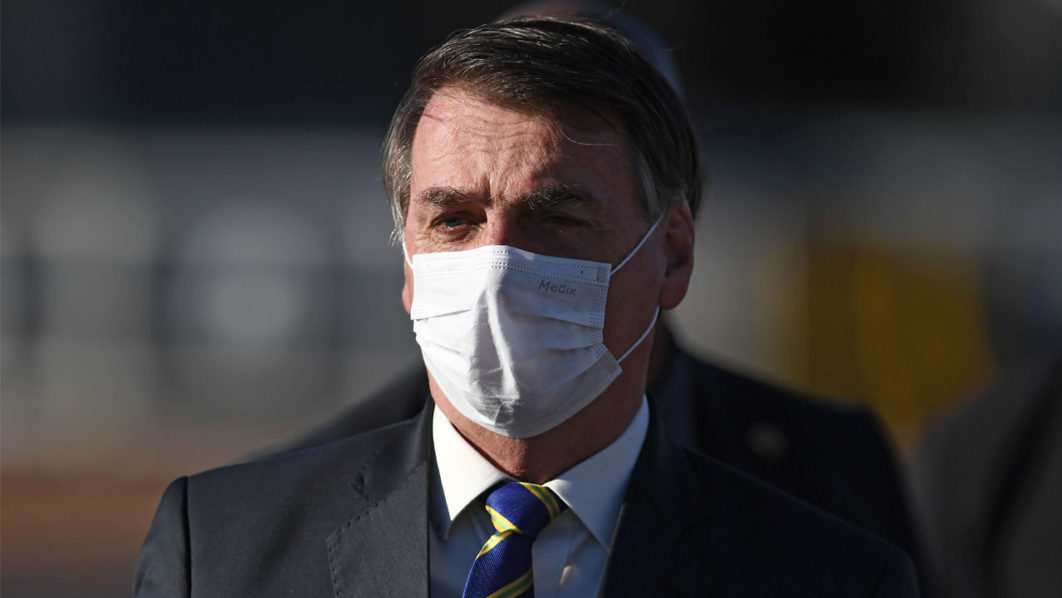By AFP
 |
| (FILES) In this file photo taken on May 12, 2020 Brazilian President Jair Bolsonaro. (Photo by EVARISTO SA / AFP) |
Brazilians voted Sunday in municipal elections that will test the strength of the country’s rightward shift under President Jair Bolsonaro, with the coronavirus pandemic looming large — and likely denting turnout.
These are the first elections since Bolsonaro, a far-right former army captain often compared to US President Donald Trump, surged to victory in 2018, upending the political gameboard in Latin America’s biggest economy.
Postponed six weeks because of the pandemic, the vote already bears the imprint of Covid-19, which has killed more than 165,000 people in Brazil, the second-highest death toll worldwide, after the United States.
The authorities are urging Brazil’s 148 million voters to bring their own pens, respect social distancing guidelines and disinfect their hands multiple times at polling stations.
Voters are choosing the South American giant’s 5,568 mayors and city councils, with analysts watching to see where the various political camps stand midway to the next presidential elections in 2022.
Bolsonaro heads into Sunday’s first-round vote weakened by his political idol Trump’s loss in the US election and his own controversial handling of the virus, which he has downplayed as a “little flu.”
But his approval numbers are strong — more than 40 percent recently — and he still excels at whipping his hardline base into a frenzy with his social media diatribes.
The president’s picks do not look set to win Brazil’s biggest cities.
In Sao Paulo, Bolsonaro acolyte Celso Russomanno trails center-right Mayor Bruno Covas, who is seeking reelection.
And in Rio de Janeiro, Mayor Marcelo Crivella, an Evangelical pastor and Bolsonaro ally, trails ex-mayor Eduardo Paes.
However, analysts say the country is likely headed for a new wave of conservative victories, elevating a raft of Evangelical candidates and ex-police and -soldiers who have made religion and security central in their campaigns.
“2020 is going to deepen what we saw in 2018: the advance of right-wing parties,” said political scientist Oswaldo Amaral of the University of Campinas.
The Brazilian left meanwhile remains weakened and divided after the impeachment of president Dilma Rousseff in 2016 and the jailing of her predecessor, Workers’ Party founder Luiz Inacio Lula da Silva, on corruption charges.
One of the few bright spots for the left wing is the southern city of Porto Alegre, where Communist Party of Brazil candidate and rising political star Manuela D’Avila leads in the polls.
– Covid fears -In a survey by the Democracy Institute, 27 percent of Brazilians said they feared voting because of Covid-19.
Voters carefully lined up one meter apart outside polling stations, trickling inside one at a time to vote, AFP correspondents said.
There were long lines at some polling stations, with many — though not all — voters in face masks.
“I’m sure there’s going to be a Covid outbreak after these elections. There’s a big crowd outside the polling station, and a lot of people without masks,” wrote one Twitter user casting his ballot in Rio de Janeiro.
In an effort to generate buzz and overcome voter reluctance, many candidates have resorted to colorful nicknames and campaign gimmicks.
There are 18 Obamas, three Trumps and 84 Bolsonaros on the ballot, according to a count in the Brazilian media — not to mention 99 Tiriricas, borrowing the name of a clown elected to Congress in 2010 on the slogan, “It can’t get any worse.”
He has since been reelected twice.
Early results are expected around 10:00 pm (0100 GMT Monday).
A second round will be held on November 29 for large cities where no candidate wins more than half the vote in the first round.
In this article:
